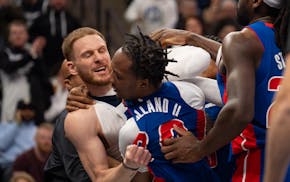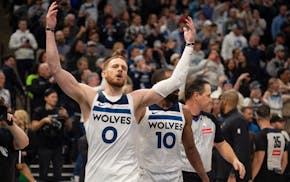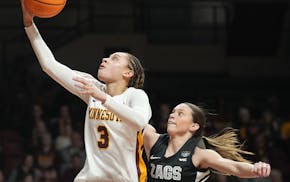As the Twins pinch single-digit millions this offseason (the pro sports equivalent of pennies), bigger-spending teams are continuing to widen the gap between the haves and have-nots.
The most recent and significant example, of course, was the $765 million contract free agent Juan Soto reportedly agreed to with the Mets.
The poor, pitiful Yankees were said to have offered ONLY $760 million and came up a little short in their bid to retain Soto.
A little over five years ago, after Manny Machado signed a $300 million deal, I mused about how long it will be until a U.S. pro athlete signed a $1 billion contract. We're accelerating closer to that number faster than even I could have imagined.
Those of us who keep thinking there has to be a tipping point have yet to see it. Those of us who have been worried for a while about how more modest spenders like the Twins can keep up with all this should be increasingly alarmed.
Then again, it's not like the Twins couldn't have competed for Soto or even last year's big prize, Shohei Ohtani (making a paltry $700 million), with a little bit of creativity — something I talked about on Tuesday's 1,000th episode of the Daily Delivery podcast.
Here's the math and the sort of outside-the-box thinking we need more of going forward:
The Twins are valued at about $1.5 billion according to Forbes. Some of you might have heard that they are for sale, a bombshell announcement made by the Pohlad family shortly after the end of the 2024 season.
All it would have taken, then, to reel in Soto as a permanent fixture in the lineup for the next decade-plus is 50% of the franchise. Find an investor to go halfsies, give Soto the other half (value: $750 million) and it's just that simple.
Maybe you don't want to make him a principal owner, and I get that. Even a more modest 40% stake ($600 million) plus roughly $12 million a year in salary as a player could have gotten this to the finish line (especially if the Twins could find a way to trade Chris Paddack, Willi Castro and/or Christian Vazquez).
Of course, whomever buys the Twins won't get 15 years (the length of Soto's contract) to come up with the cash for the team.
Only the Timberwolves are bought and sold on that timeline.
So any buyer would probably need to pay for the entire thing up front, then just give Soto the agreed upon share of the franchise.
Sure, it might create some animosity in the clubhouse if one stall was occupied by a team owner. But if the Twins are serious about competing with the Yankees, Mets and Dodgers, they are going to have to get creative and stop worrying about everyone's feelings.

Wolves bounce back from second-quarter brawl to blow out Pistons 123-104
Twins swept by Cardinals to begin season as Bailey Ober stumbles in opener again

Souhan: Wolves, Edwards belatedly wake up following skirmish
Moore and Rinzel each make their NHL debut with the Blackhawks

